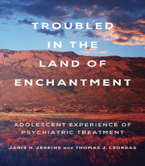
- jhjenkins@ucsd.edu
-
Lab Office: SSRB 334

Dr. Janis Hunter Jenkins is a psychological/medical anthropologist with expertise on culture and mental health. She received her Ph.D. from UCLA and post-doctoral training at Harvard Medical School. She has taught on the faculty at Harvard University, Case Western Reserve University, and University of California, San Diego. At UCSD, Dr. Jenkins is Distinguished Professor of Anthropology and Psychiatry. She is also on faculty for the Global Health Program and Director of the Center for Global Mental Health at UC San Diego. Within the Department of Anthropology, Professor Janis Jenkins is a member of the Psychological/Medical Anthropology subfield. She has been President-Elect (2021-2023) and currently is President of the American Anthropological Association's Society for Psychological Anthropology (2023-2025).
Her principal interest is the nexus of human experience, cultural processes, and structural institutions. Professor Jenkins has directed a series of funded studies on culture, mental health, emotion, treatment and healing, adolescence, refugees, and political ethos.
Her theoretical contributions include understandings of (1) cultural conceptions and socioemotional responses to mental illness as significant for the course and outcome of such conditions; (2) mental illness not as pathology but as a fundamental human process that affects all humans, to greater or lesser degrees, and for varying temporal periods; (3) the notion of "struggle" (Jenkins 2015, 2020) as far more central to illness processes than symptoms; (4) the formulation of "extraordinary conditions" (Jenkins 2015, 2020) that integrates the reciprocal production of personal distress and mental illness, on the one hand, and structural adversity in the forms of poverty, racism, misogyny, and social stigma, on the other; and (5) a theoretical formulation of orientation and atmosphere as a means for leveraging an ethnographic understanding of political subjectivity in feminist, phenomenological, and psychodynamic terms.
Dr. Jenkins’ research program as Principal Investigator or Co-Principal Investigator includes a series of grants funded by National Institute for Mental Health along with other funding agencies. Her interdisciplinary research teams work with families, adults, children and adolescents in studies of culturally diverse populations in the United States and Mexico. This research has included Mexican immigrants/migrants, Salvadoran refugees, Puerto Rican migrants, and other Spanish-speaking Latines, as well as comparative research for Euro-Americans, and Native Americans, Vietnamese and Kurdish populations.The sites of Professor Jenkins’ research include everyday settings such as homes, neighborhoods, hospitals and clinics, and schools.
Professor Jenkins has been a Fellow or Visiting Faculty at a variety of academic institutions, including Visiting Scholar at the Rockefeller Foundation Bellagio Center (2021), permanent Member of the Institute for Advanced Studies in Princeton, New Jersey (in residence, 2011-2012), and Distinguished Visiting Faculty at Monash University in Melbourne, Australia (2013). The American Philosophical Society awarded her a year-long appointment in 2004, and in 2002 she was Visiting Professor in the Department of Health and Human Sciences, Institute of Social Medicine, State University of Rio de Janeiro, Brazil. The Russell Sage Foundation appointed her as Visiting Scholar-in-Residence in New York City (1996-1997). At the U.S. National Institute of Mental Health, Dr. Jenkins has provided expertise as a member of three Scientific Review Groups (1993-2005). At Case Western Reserve University, Professor Jenkins was elected President of the Women’s Faculty Association (1991-1993) and appointed as Director of Women’s Studies Program (1994-2000). At Harvard Medical School, she was appointed Research Fellow, Instructor, and Head Preceptor in the Departments of Social Medicine, Anthropology, and Psychiatry (1986-1990). From 1984-1986, she was appointed as Assistant Research Anthropologist at UCLA in the Department of Psychiatry and Biobehavioral Sciences.
Dr. Jenkins has been a member of various Editorial Boards, including Medical Anthropology Quarterly (Society for Medical Anthropology) and currently for the Editorial Boards of Ethos: Journal of the Society for Psychological Anthropology (for which she was Co-Editor,1995-2000) and Culture, Medicine, and Psychiatry: An International Journal of Cross-Cultural Comparative Research.
2020 Jenkins, Janis H. and Thomas J. Csordas. Troubled in the Land of Enchantment: Adolescent Experience of Psychiatric Treatment. Oakland: University of California Press.

2015 Jenkins, Janis H. Extraordinary Conditions: Culture and Experience in Mental Health. University of California Press.
 .
.
2020 ILHA Revista de Anthropologia 22(1): 234-241
For the Portuguese version, click here
2018 L’Homme. Revue française d’anthropologie (Vol. 225): 223-225
2017 Somatosphere Science. Medicine, and Anthropology Collaborative Website
2017 Medical Anthropology Quarterly 31(4)
2016 Ethos: J Society Psychological Anthropology 44(4): 23-e25
2016 American Anthropologist: American Anthropological Association
2016 CHOICE Connect: "This extraordinary book will be relevant to all who are interested in medical anthropology, psychiatry, and health studies. . . . Highly recommended" (as excerpted on U of California website)
2015 Online Interview - Classical 89.org - Radio program "Thinking Aloud" listed as follows: "In her new book Extraordinary Conditions: Culture and Experience in Mental Illness, medical anthropologist Janis H. Jenkins explores a little-known aspect of mental illness: that its onset, manifestation, diagnosis, and cure are all filtered through the
lens of culture. In other words, the same biological illness looks and acts differently depending on the cultural context in which it occurs. This is a perspective primarily available via the tools of medical anthropology and Jenkins is here to discuss her research on this topic. BYU Broadcasts.
2011 Jenkins, Janis H. Introduction. (Pharmaceutical Self) and Chapter 1: Pharmaceutical Self and Imaginary in the Social Field of Psychiatric Treatment. In Pharmaceutical Self: The Global Shaping of Experience in an Age of Psychopharmacology. School of Advanced Research Press; pgs. 3-16. & pgs. 17-40.

Book Reviews
2014 Medical Anthropology Quarterly 28(1): b35-b37
2013 Transcultural Psychiatry 50(4): 599–604
2004 Jenkins, Janis H. and Robert J. Barrett. Schizophrenia, Culture, and Subjectivity: The Edge of Experience. Janis H. Jenkins and Robert J. Barrett, Eds. Cambridge University Press

Book Reviews
2009 Transcultural Psychiatry 46(1)
2005 Psychiatric Services
2004 Disability Studies Quarterly 24(4)
2025 Jenkins, Janis H. Orientation and atmosphere: Toward an anthropology of political subjectivity. Ethos e70023. https://doi.org/10.1111/etho.70023
2025 Jenkins, Janis H. Prologue, Salud Mental Colectiva: Rethinking Collective Mental Health, Volume II, Proposals, Experiences and Challenges. Carlos Madariaga Araya, Ana María Oyarce Pisani, Angel Martínez-Hernáez, Eduardo Menéndez Spina, Editors. Santiago, Chile.
2024 Sanchez, Giselle and Janis H. Jenkins. Social media use and socioemotional wellbeing among multiethnic middle school students. Social Science and Medicine 348:116839. doi: 10.1016/j.socscimed.2024.116839. Epub: Mar 29. PMID: 38581816.
2023 Jenkins, Janis H. Conceptions of mental illness and psychopharmaceuticals in Global Health. (English and Spanish) Revista Antropologia Social 32(2):117-122.
2023 Jenkins, Janis H. Intimate and Social Spheres of Mental Illness. In Arc of Interference: Medical Anthropology for Worlds on Edge, Joao Biehl and Vincanne Adams, Eds. pp. 133-160, Duke University Press.
2022 Jenkins, Janis H., Giselle Sanchez, Eric Miller, Nadia Santillanes, Grace Urano and Alexandra Pryor. Depression and anxiety among multiethnic middle school students: Age, gender, and sociocultural environment. International journal of social psychiatry 0(0) 1-11.
2020 Jenkins, Janis H. and Thomas J. Csordas. Troubled in the Land of Enchantment: Adolescent Experience of Psychiatric Treatment. University of California Press.
2020 Jenkins, Janis H. Giselle Sanchez, and Olga Olivas. Loneliness, adolescence, and global mental health: Soledad and structural violence in Mexico. Transcultural Society 57(5):673–687
2019 Claudia Rafful, María Elena Medina-Mora, Patricia González-Zúñiga, Janis H. Jenkins, M. Gudelia Rangel, Steffanie A. Strathdee & Peter J. Davidson. "Somebody Is Gonna Be Hurt": Involuntary Drug Treatment in Mexico, Medical Anthropology 1-15.
2018 Thomas Csordas and Janis H. Jenkins. Living with a Thousand Cuts: Self-Cutting, Agency, and Mental Illness among Adolescents. Ethos: Journal of the Society for Psychological Anthropology 46(2): 206-229.
2018 Jenkins, Janis H. Anthropology and Psychiatry: A Contemporary Convergence for Global Mental Health. In Textbook of Cultural Psychiatry, Second Edition. Dinesh Bhugra and Kamaldeep Bhui, Eds. Cambridge University Press.
2017 Ellen E. Kozelka and Janis H. Jenkins. Renaming Non-Communicable Diseases. Correspondence, The Lancet 5:e655.
2017 Jenkins, Janis H., and Annika Stone. Global Mental Health and Adolescent Anxiety: Kin, Care and Struggle in New Mexico. Culture, Medicine, and Psychiatry 1-21.
2017 Olga Olivas, Sol D'Urso, and Janis H. Jenkins. Adolescence and Global Mental Health: Cultural Perceptions of Emotional Wellbeing in Tijuana, Mexico.
2017 Janis H. Jenkins and Ellen E. Kozelka. Global Mental Health and Psychopharmacology in Precarious Ecologies: Anthropological Considerations for Engagement and Efficacy. In The Palgrave Handbook of Sociocultural Perspectives on Global Mental Health. Ross White, Ursula Read, Sumeet Jain, David Orr, Eds. Palgrave Press. pgs. 151-168
2017 Janis H. Jenkins et al. “Somebody Is Gonna Be Hurt”: Involuntary Drug Treatment in Mexico. Medical Anthropology. pgs. 1545-5882
2015 Jenkins, Janis H. Tensión
2015 Janis H. Jenkins and Bridget M. Haas. Trauma in the Lifeworlds of Adolescents: Hard Luck and Trouble in the Land of Enchantment. In Devon Hinton and Byron Good (Eds). Culture and PTSD. Philadelphia: University of Pennsylvania Press.
2015 Jenkins, Janis H. Straining Psychic and Social Sinew: Trauma among Adolescent Psychiatric Patients in New Mexico. Medical Anthropology Quarterly 29(1):42-60.
2014 Frank Larøi, Tanya Luhrmann, Vaughan Bell, William A. Christian Jr., Smita Deshpande, Charles Fernyhough, Janis Jenkins, Angela Woods. Culture and hallucinations: overview and future directions. Schizophrenia Bulletin 40(4):S213-S220.
2014 Jenkins, Janis H. and Mary-Jo DelVecchio Good. “Women and global mental health: vulnerability and empowerment." In Essentials of Global Mental Health. Samuel O. Opakpu, Ed. Cambridge University Press.
2013 Jenkins, Janis H. Palpable Insecurity and Sen’s Comparative View of Justice: Anthropological Considerations. Critical Review of Social and Political Philosophy 16(2):266-283.
2012 Jenkins, Janis H. The Anthropology of Psychopharmacology: Commentary on Contributions to the Analysis of Pharmaceutical Self and Imaginary. Culture, Medicine, and Psychiatry 36(1):78-79
2011 Jenkins, Janis H. et al. Illness experience and reasons for nonadherence among individuals with bipolar disorder who are poorly adherent with medication. Compr Psychiatry 52(3): 280–287
2010 Sajatovic, M., J. Levin, E Fuentes-Casiano, K. Cassidy, C. Tatsuoka, and J. Jenkins. Illness experience and reasons for non-adherence among individuals with bipolar disorder who are poorly adherent with medication. Comprehensive Psychiatry 52:280-287.
2010 Kriegshauser, Kathryn, Martha Sajatovic, Janis H. Jenkins, Kristin A. Cassidy, David Muzina, Omar Fattal, Douglas Smith, Beth Singer. Gender Differences in Subjective Experience and Treatment of Bipolar Disorder. Journal Nervous and Mental Disease 198(5):370-371.
2010 Rubinstein, E., Breitborde, N.J., and Janis H. Jenkins. Editorial. Anthropological intervention early in psychosis. Early Intervention in Psychiatry 4:108-110.
2010 Jenkins, J. H. The State Construction of Affect: Political Ethos and Mental Health among Salvadoran Refugees. Culture, Medicine, and Psychiatry 15:139-165. Reprint in A Reader in Medical Anthropology: Theoretical Trajectories, Emergent Realities. Ed. B.Good, M. Frischer, S.Willen, and MJD Good, EDS. Wiley Blackwell, Chichester, UK. pp143-159.
2009 Jenkins, Janis H. Commentary on “Brokering Authenticity Borderline Personality Disorder and the Ethics of Care in an American Eating Disorder Clinic by Rebecca J. Lester. Current Anthropology 50(3):295-296.
2009 Sajatovic, M., Jenkins, J. H., Cassidy, K. A., & Muzina, D. Medication treatment perceptions, concerns and expectations among depressed individuals with Type I Bipolar Disorder. Journal of Affective Disorders, 115(3), 360–366.
2009 Meyer, W.J., Lamkin, N., Calabrese, J.R., Jenkins, J.H. Subjective aspects of medication treatment and medication adherence among individuals with bipolar disorder. New Research In Mental Health. Vol. 18.
2009 Floersch, J., Townsend, L., Longhofer, J., Munson, M., Winbush, V., Kranke, D., Faber, R., Thomas, J., Jenkins, J. H. and Findling, R. Adolescent experience of psychotropic treatment. Transcultural Psychiatry, 46(1), 157-179.
2009 Lopez , S., J Ramirez, J. Ullman, A. Kopelowicz, J. Jenkins, N. Breitborde, P.
2009 Hollifield, M., T. Warner, B. Krakow, J. H. Jenkins, and J. Westermeyer.The Range of Symptoms in Refugees of War: The New Mexico Refugee Symptom Checklist-121. Journal Nervous and Mental Disease197:117-125.
2009 Jenkins, Janis H. and Megan Nordquest Schwallie. Parental Psychiatric Illness. In The Child: An Encyclopedic Companion. Shweder, Richard A., Thomas R. Bidell, Anne C. Dailey, Suzanne D. Dixon, Peggy J. Miller, and John Modell, eds. Chicago: University of Chicago Press.
2009 Jenkins, Janis H. and Elizabeth Carpenter-Song. Awareness of Stigma among Persons with Schizophrenia: Marking the Contexts of Lived Experience. Journal of Nervous and Mental Disease197(7):520-529.
2008 Jenkins, Janis H. and Elizabeth Carpenter-Song. Stigma Despite Recovery: Strategies for Living in the Aftermath of Psychosis. Medical Anthropology Quarterly22(4):22(4):381-409.
2008 Jenkins, Janis H., Hollifield, Michael A. Postcoloniality as the Aftermath of Terror between Vietnamese Refugees. In Postcolonial Disorders. Good, M.J.D, Hyde, S.T., Pinto, S., and B.J. Good, Eds. Berkeley and Los Angeles: University of California Press.
2008 Martha Sajatovic, Janis H. Jenkins, Roknedin Safavi, Jane A. West, Kristin A. Cassidy, William J. Meyer, Joseph R Calabrese. Personal and societal construction of illness among individuals with rapid cycling bipolar disorder: A life-trajectory perspective. American Journal of Geriatric Psychiatry 16(9):718-26.
2007 Sajatovic M, Jenkins J. H. Is antipsychotic medication stigmatizing for people with mental illness? International Review of Psychiatry 19(2):107-12.
2007 Jenkins, Janis H. Anthropology and Psychiatry: The Contemporary Convergence. In Textbook of Cultural Psychiatry. Bhugra, Dinesh and Kamaldeep Bhui., Editors. Cambridge University Press.
2007 Vega, W.A, Karno, M., Alegría, M., Alvidrez, J., Bernal, G., Escamilla, M., Escobar, J., Guarnaccia, P., Jenkins, J.H., Kopelowicz, A., Lagomasino, I.T., Lewis-Fernandez, R., Marin, H., Lopez, S., Loue, S. Research issues for improving treatment of U.S. Hispanics with persistent mental disorders. Psychiatric Services 58(3):385-394.
2007 Breitborde , Nicholas J. K., López, Steven R., Wickens, Thomas D., Jenkins, J.H. Karno, Marvin. Toward Specifying the Nature of the Relationship between Expressed Emotion and Schizophrenic Relapse: The Utility of Curvilinear Models. International Journal of Methods in Psychiatric Research 16(1):1-10.
2006 Ramirez Garcia, Jorge, Chang, Christina, Young, Joshua, Lopez, Steven, Jenkins, J.H. Family support predicts medication usage among Mexican American individuals with schizophrenia. Journal of Social Psychiatry and Psychiatric Epidemiology 41:624-631.
2006 Hollifield, M.H., Warner T, Jenkins J., Sinclair-Lian N, Krakow B, Eckert V, Karadaghi P, Westermeyer J. Assessing War Trauma in Refugees: Properties of the Comprehensive Trauma Inventory-104 (CTI-104). J. Traumatic Stress: 19(4):527-540.
2005 Jenkins, Janis H. and Elizabeth Carpenter-Song. The New Paradigm of Recovery from Schizophrenia: Cultural Conundrums of Improvement without Cure. Culture, Medicine, and Psychiatry29(4):379-413.
2005 Jenkins, J.H., Strauss, M.E., Carpenter, E., Miller, D., Floersch, J., Sajatovic, M. Subjective Experience of Recovery from Schizophrenia with Atypical Antipsychotic Medications. International Journal of Social Psychiatry51(3):211-227.
2005 Sajatovic, M., Davies, M., Bauer, M., McBride, L., Hays, R., Safavi, R., and J. Jenkins. Attitudes regarding the collaborative practice model and treatment adherence among individuals with bipolar disorder. Comprehensive Psychiatry 46:272-277.
2005 Hollifield, M.H., Eckert, V., Warner, T., Jenkins, J.H., Krakow, B., Ruiz, J., Westermeyer, J. Development of an Inventory for Measuring War-Related Events in Refugees. Comprehensive Psychiatry 46:67-80.
2005 Sajatovic M., Jenkins, J.H., Strauss, ME., Butt, ZA, Carpenter, E. Gender identity and implications for recovery among men and women with schizophrenia. Psychiatric Services 56:96-98.
2004 López, S. R., Nelson, K.A., Polo, A. J., Jenkins, J.H., Karno, M., Snyder, K. Ethnicity, Expressed Emotion, Attributions and Course of Schizophrenia: Family Warmth Matters. J. Abnormal Psychology: 113:428-439.
2004 Jenkins, Janis H. Schizophrenia as a Fundamental Human Process. In Schizophrenia, Culture, and Subjectivity: The Edge of Experience. J.H. Jenkins and R.J. Barrett, Eds. Cambridge University Press, pgs. 29-61.
2004 Jenkins, Janis H. and Robert J. Barrett. Introduction. In Schizophrenia, Culture, and Subjectivity: The Edge of Experience. Janis H. Jenkins and Robert J. Barrett, Eds. Cambridge University Press, pgs. 1-25.
2003 Longhofer, J., Floersch, J., and J. Jenkins. Medication effect interpretation and the social grid of management. Social Work in Mental Health 1(4), 71-89.
2003 Floersch, J., Longhofer, J., and J. Jenkins. The social grid of community medication management. American Journal of Orthopsychiatry 73:24-34.
2002 Nasser, L.,
2001 Hollifield, Michael A., Warner, T D., Lian, N., Krakow, B., Jenkins, J.H., Kesler, J., Stevenson, J., Westermeyer, J. Measuring trauma and health status in refugees: a critical review. Journal of the American Medical Association 288:611-621.
1999 Jenkins, J. H., and Schumacher, J. Family burden of schizophrenia and depressive illness: Specifying the effects of ethnicity, gender and social ecology. British Journal of Psychiatry174:31-38.
1998 J.H. Jenkins. Diagnostic Criteria for Schizophrenia and Related Psychotic Disorders: Integration and Suppression of Cultural Evidence in DSM-IV. Transcultural Psychiatry 35:357-376.
1998 V. L. D. Coelho, M.E. Strauss and J.H. Jenkins. Expression of Symptomatic Distress by Latino and Euro-American Patients with Depression and Schizophrenia." Journal of Nervous and Mental Disease 186:477-483.
1998 J.H. Jenkins and N. Cofresi. The Sociosomatic Course of Depression and Trauma: A Cultural Analysis of Suffering and Resilience in the Life of a Puerto Rican Woman. Psychosomatic Medicine 60:439-447.
1998 J.H. Jenkins. The Medical Anthropology of Political Violence: A Cultural and Feminist Agenda. Medical Anthropology Quarterly 12:122-131.
1997 J.H. Jenkins. Subjective experience of persistent schizophrenia and depression among U.S. Latinos and Euro-Americans. British Journal of Psychiatry 170:20-25.
1997 T.J. Csordas and J.H. Jenkins. Editorial Statement: Ethnographic Standpoints. Theme Issue on Ethnography and Sociocultural Processes: A Symposium. Ethos: Journal of the Society of Psychological Anthropology 25(2): 143-145.
1997 J.H. Jenkins. Not Without a Trace: Resilience and Remembering among Bosnian Refugees. Commentary on Weine et al.'s "A Family Survives Genocide." Psychiatry Spring, Vol. 60:40-43.
1997 J.H. Jenkins and D. Kinzie. Culture and the Diagnosis of Adjustment Disorders. In DSM-IV: Sourcebook, Volume 3. Widiger, T., Frances, A., Pincus, H, Ross, R., First, M., and Davis, W. (Eds.), Washington D.C.: American Psychiatric Association, pgs. 969-973.
1997 M. Karno and J.H. Jenkins. Culture and the Diagnosis of Schizophrenia and Related Disorders and Psychotic Disorders Not Otherwise Classified. In DSM-IV: Sourcebook, Volume 3. Widiger, T., Frances, A., Pincus, H, Ross, R., First, M., and Davis, W. (Eds.), Washington D.C.: American Psychiatric Association, pgs. 901-908.
1996 J. H. Jenkins. Culture, Emotion and Psychiatric Disorder. Revised edition of Medical Anthropology: Contemporary Theory and Method, T. Johnson and C. Sargent, Eds., New York: Praeger Press, pgs. 71-87.
1996 J.H. Jenkins. The Impress of Extremity: Women's Experience of Trauma and Political Violence. In Gender and Health: An International Perspective. Carolyn Sargent and Caroline
1996 J.H. Jenkins. Culture, Emotion, and Post-Traumatic Stress Disorder. In Ethnocultural Aspects of Post-Traumatic Stress Disorder. A. Marsella and N. Freedman, Eds., Washington D.C.: American Psychological Association Press, pgs. 165-182.
1996 J.H. Jenkins. Cultural Comments on Adjustment and Stress Disorders. In Culture and Psychiatric Diagnosis: A DSM-IV Perspective. Washington D.C.: American Psychiatric Association, pgs. 227-231.
1995 J.H. Jenkins, M. Warren, M. Strauss, F. Bloom, C. Jacobson, and A. Frasca. Sociocultural Dimensions of "Family Burden:" The Specificity of Ethnic, Gender and Diagnostic Effects. Schizophrenia Research 15(1-2): 217.
1994 J.H. Jenkins. The Psychocultural Study of Emotion and Mental Disorder. In Handbook of Psychological Anthropology, P. Bock, (Ed.). Greenwood Publishers, pgs. 97-120.
1994 J.H. Jenkins and M. Valiente. Bodily Transactions of the Passions: El Calor (The Heat) among Salvadoran Women. In Embodiment and Experience: The Existential Ground of Culture and Self. T. Csordas, (Ed.), Cambridge University Press, pgs. 163-182.
1994 J.H. Jenkins. Culture, Emotion, and Psychopathology. In Emotion and Culture: Empirical Studies of Mutual Influence. S. Kitayama and H. Markus, (Eds.), American Psychological Association Press, pgs. 307-335.
1993 B. Weisman, S. Lopez, M. Karno, and J.H. Jenkins. An Attributional Analysis of Expressed Emotion in Mexican American Families with Schizophrenia. Journal of Abnormal Psychology 102:601-606.
1993 M. Karno and J.H. Jenkins. Cross-Cultural Issues in the Course and Treatment of Schizophrenia. In Psychiatric Clinics of North America, P. Powchik and C. Schulz, (Eds.). Philadelphia: W.B. Saunders Company, pgs. 339-350.
1992 J.H. Jenkins. Too Close for Comfort: Schizophrenia and Emotional Overinvolvement Among Mexicano Families. In Ethnopsychiatry. Atwood Gaines, (Ed.). Albany, New York: State University of New York Press, pgs. 203-221.
1992 J.H. Jenkins. Theoretical Considerations of Qualitative Method: Behavioral Science Research of Relevance to Primary Care Interventions. In Assessing Interventions: Traditional and Innovative Methods, F. Tudiver, M. Bass, E. Dunn, P. Norton, and M. Stewart. (Eds.). Newbury Park, California: Sage Publications; pgs. 69-79
1992 J. H. Jenkins and M. Karno. The Meaning of "Expressed Emotion:" Theoretical Issues Raised by Cross-Cultural Research. Special Article in American Journal of Psychiatry 149: 9-21.
1991 J.H. Jenkins. Invited Book Review on Hispanics and Mental Health: A Framework for Research, L. Rogler, R. Malgady, and O. Rodriquez. Medical Anthropology Quarterly 5(2):186-188.
1991 J. H. Jenkins. The State Construction of Affect: Political Ethos and Mental Health among Salvadoran Refugees. Culture, Medicine, and Psychiatry 15:139-165. Reprinted in 2010 in A Reader in Medical Anthropology: Theoretical Trajectories, Emergent Realities, B.J. Good, M. Fischer, S. Willen, and M.J. DelVecchio Good, Eds. Wiley-Blackwell.
1991 J. H. Jenkins. The 1990 Stirling Award Essay. Anthropology, Expressed Emotion, and Schizophrenia. Ethos: The Journal of the Society for Psychological Anthropology 19:387-431.
1991 J. H. Jenkins, A. Kleinman, and B. J. Good. Cross-Cultural Aspects of Depression. In J. Becker and A. Kleinman, (eds.), Advances in Affective Disorders: Theory and Research,Volume I. Psychosocial Aspects. Erlbaum Press, pgs. 67-99.
1989 J.A. Doane, D. Miklowitz, E. Oranchak, R. Flores de Apodaca, M. Karno, A. Strachan, and J. H. Jenkins. Parental Communication Deviance and Schizophrenia: A Cross-Cultural Comparison of Mexican-Americans and Anglo-Americans. Journal of Abnormal Psychology 98:487-490.
1988 J.H. Jenkins. Conceptions of Schizophrenic Illness as a Problem of Nerves: A Comparative Analysis of Mexican- Americans and Anglo-Americans. Social Science and Medicine 26:1233-1243.
1988 J. H. Jenkins. Ethnopsychiatric Interpretations of Schizophrenic Illness: The Problem of
1987 M. Karno, J.H. Jenkins, A. de la Selva, F. Santana, C. Telles, S. Lopez, and J. Mintz. Expressed Emotion and Schizophrenic Outcome among Mexican- American Families. Journal of Nervous and Mental Disease 175:143-151.
1986 J.H. Jenkins, M. Karno, A. de la Selva, and F. Santana. Expressed Emotion in Cross-Cultural Context: Family Responses to Schizophrenic Illness among Mexican-Americans. In M.J. Goldstein, I. Hand, and K. Hahlweg, (eds.), Treatment of Schizophrenia: Family Assessment and Intervention, pp. 35-49. New York: Springer-Verlag.
1986 J.H. Jenkins, M. Karno, A. de la Selva, F. Santana, C. Telles, S. Lopez, and J. Mintz. Expressed emotion, maintenance pharmacotherapy, and schizophrenic relapse among Mexican-Americans. Psychopharmacology Bulletin 22(3):621-627.
1986 A. Magana, M. Goldstein, M. Karno, D. Miklowitz, J.H. Jenkins, and I. Falloon. Expressed Emotion in Relatives of Psychiatric Patients. Psychiatry Research: 203- 212.